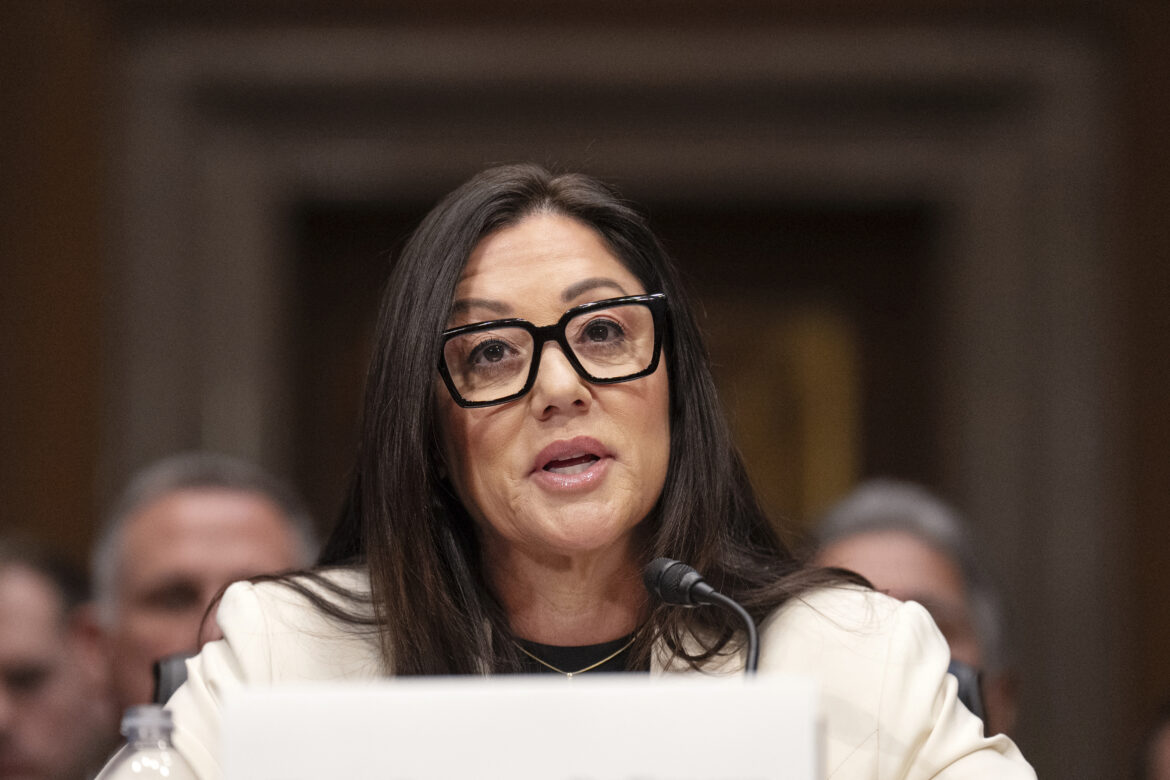By Cathy Bussewitz in New York
NEW YORK (AP) — Members of a Senate committee grilled Labor Secretary-designate Lori Chavez-DeRemer on Wednesday about her past support of pro-union legislation, her position on raising the federal minimum wage and her willingness to disagree with President Donald Trump.
Democrats sought assurances during the nominee’s confirmation hearing that if confirmed, Chavez-DeRemer would protect private data held by the Department of Labor. Republican members of the Senate Committee on Health, Education, Labor & Pensions asked if she still backed a bill that would have made it easier for workers to unionize.
Union leaders have described Chavez-DeRemer, a former Republican member of Congress from Oregon and former mayor of a small city on the edge of liberal-leaning Portland, as a friend of organized labor. But workers’ rights advocates questioned whether she would be able to uphold that reputation in an administration that has fired thousands of federal employees.
Sen. Bill Cassidy, a Republican from Louisiana who chairs the committee, opened the hearing by saying the Trump administration had an opportunity to enact a pro-American agenda. He said business owners were concerned about Chavez-DeRemer’s past support in Congress of the Protecting the Right to Organize Act. A section of the PRO Act would have overturned state “right to work” laws that give employees the right to refuse to join a union in their workplace.
During her opening statement, Chavez-DeRemer described the proposed law as “imperfect.” When Cassidy asked her if she still supported it, she declined to give a yes or no answer.
“I do not believe the secretary of labor should write the laws. It would be up to Congress to write the law,” she said.
Vermont independent Bernie Sanders, the committee’s ranking member, asked Chavez-DeRemer if she would be a rubber stamp for the administration or stand with workers.
“If confirmed, my job will be to implement President Trump’s policy vision,” Chavez-DeRemer said. “And my guiding principle will be President Trump’s guiding principle — ensuring a level playing field for businesses, unions, and, most importantly, the American worker.”
Pressed by Republican senators, Chavez-DeRemer said she no longer supported the part of the bill that curtailed the ability of workers in unionized workplaces to opt-out of membership.
“So you no longer support the aspect of the PRO Act that would have overturned state right to work laws?” Sen Rand Paul, R-Ky., asked.
“Yes, sir,” Chavez-DeRemer responded.
During her one term as a congresswoman, Chavez-DeRemer’s voting record earned her strong union support. Some political observers surmised that Trump picked her as his labor secretary as a way to appeal to voters who are members of or affiliated with labor organizations. She is the daughter of a Teamster member.
If confirmed as secretary, Chavez-DeRemer would be in charge of the Department of Labor’s nearly 16,000 full-time employees and a proposed budget of $13.9 billion in fiscal year 2025. She would set priorities that impact workers’ wages, ability to unionize, and health and safety, as well as employers’ rights to fire employees.
But it’s unclear how much power Chavez-DeRemer would be able to wield as Trump’s Cabinet moves to slash U.S. government spending and the size of the federal workforce. During his first month in office, the president froze trillions of dollars in federal funding and offered buyouts to most federal workers.
His administration last week started laying off nearly all probationary employees who had not yet gained civil service protection. Billionaire Elon Musk, who leads Trump’s Department of Government Efficiency, has called for getting rid of entire agencies.
“The Department of Labor is the agency where people in building are supposed to wake up every day thinking about how they can improve the lives of working people,” said Adam Shah, director of national policy at Jobs with Justice, a nonprofit organization that promotes workers’ rights. “It’s quite possible that no matter what the secretary of labor stands for, the billionaire embedded in the Trump administration, who is so keen on destroying the institutions, will be interested in gutting the Department of Labor.”
In January, Trump fired two of three Democratic commissioners serving on the Equal Employment Opportunity Commission, a federal agency that enforces civil rights in the workplace. He also fired the acting chair of the National Labor Relations Board, Gwynne Wilcox, the first Black woman to serve as an NLRB member, as well as General Counsel Jennifer Abruzzo. Wilcox sued the Trump administration, arguing that federal law protects her from being arbitrarily dismissed.
Republicans have made inroads with working-class voters. Despite decades of labor unions siding with Democrats, and Trump’s apparent support for firing striking workers, his populist appeal gained him votes from rank-and-file union members.
Many major unions, including the AFL-CIO and the United Auto Workers, endorsed Democrat Kamala Harris in the presidential race. The International Brotherhood of Teamsters declined to endorse a candidate, and Teamsters leader Sean O’Brien spoke at the Republican National Convention. The Teamsters have endorsed Chavez-DeRemer’s nomination.
Some observers expect Chavez-DeRemer to receive more votes from Senate Democrats than some of Trump’s other Cabinet selections did. But the same positions that won her support from unions may make her a harder sell with business groups; the American Trucking Associations and the International Franchise Association said they hoped she would disavow her past support for the Pro Act by working to get it overturned.
Emily Twarog, an associate professor in the school of labor and employment relations at the University of Illinois, said a question mark hangs over the labor secretary-designate even if she gets the Senate committee’s approval.
With the ongoing efforts by the current administration to limit or eliminate certain government functions, “how much will she actually be able to do to help workers in the Department of Labor if there’s limited funding and restrictions put on the work that can be done?” Twarog said.
News Value: 3The Associated Press966 words
Metadata
Slugline
US-Trump-Cabinet-Labor
Wire CategoryBusinessInternational
SubjectPrint
Media typeWire text






